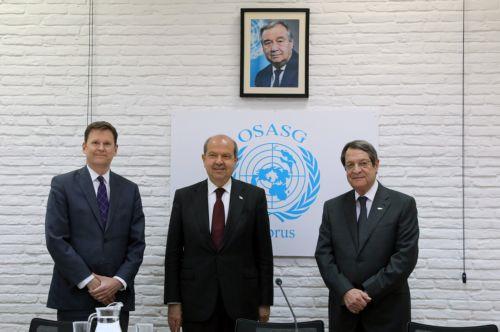The scenario of a mutually agreed solution to the Cyprus problem is fading and would not be available much longer UN Special Representative in Cyprus Colin Stewart said on Thursday.
Speaking during the Cyprus Forum, an annual independent conference aiming to be a catalyst for discussions and debates on key policy issues in Cyprus and in the wider Eastern Mediterranean region, Stewart said finding a solution that is acceptable to both Greek and Turkish Cypriots is becoming more difficult.
“There is currently a political impasse with regard to the Cyprus problem. The positions of the two sides are indeed far apart – they cannot even agree on what settlement talks would be about, let alone the conditions for coming back to the table,” he said.
“I do not think this impasse is necessarily insurmountable in the medium term, but realistically I don’t see much prospect of talks before the coming elections on the island and in the region over the next year. And after those elections, we may find ourselves in a new context, for better or worse. It is impossible at this point to predict,” he added.
Stewart said that while there may be dim prospect of talks anytime soon, there was something much more fundamental at stake in this moment.
“I am extremely concerned that the option of a mutually-agreeable settlement of the conflict – in other words a formula for reunifying the island acceptable to both parties – is fading and will not be available much longer,” Stewart said.
“The separation of the island is growing, and the integration of the north – economically and politically – with Turkey is accelerating due to the very difficult economic situation on that side of the island.”
He went on to say that greater dependence of the north on Turkey, especially economic, necessarily means less interdependence between the two sides of the island, adding that interdependence is the glue that can hold the island together.
“If present trends continue, the idea of a mutually agreeable settlement will soon become unviable. So we are running out of time, and cannot afford to simply wait until the next time the two sides are ready to talk,” he added.
Stewart said that the economic stress in the north and growing economic divide between the two sides of the island also breeds resentment and lack of trust between them.
He said he hears from many Turkish Cypriots that they are unhappy about the current trend, but they see no alternative. Providing a north-south alternative would be a major step – perhaps the most crucial step – towards reviving the hope for a comprehensive settlement,” he said.
Moreover, he said that the economic disparity between the two sides of the island creates all kinds of adjustment challenges which make agreement on a settlement even more challenging, and in the meantime it spurs trafficking of all sorts across the buffer zone, which is a serious problem for both sides.
“For all these reasons, the dire economic situation in the north is undermining the prospects for a settlement. It is not, as some people continue to believe, helping move the north towards a settlement,” Stewart said.
He expressed the belief that a majority of Cypriots want the division of the island to end “but they are losing hope”.
“And when the populations no longer have any enthusiasm for a settlement, it is hard to imagine political leaders forging an agreement on their own initiative,” he said.
Stewart said that nothing brings people together more quickly and more strongly than economic interest. Expanding trade and business links, and ensuring the infrastructure to support them, was the surest way to rehabilitating confidence in a settlement. Integrating the island in practice paves the way for a political solution.”
“For these reasons, I am working intensively with the lead representatives of the two leaders to complete a wide range of joint initiatives that will not only benefit Cypriots across the island but will also lay an important path towards settlement talks,” he added.
Stewart said that in terms of economic initiatives, the UN was working to expand trade through the Green Line Regulation, remove obstacles to cross-border banking, address insurance problems and ease congestion at the crossing points.
“Although protectionist voices are the loudest, there is immediate mutual benefit in increasing trade. Both Greek Cypriot and Turkish Cypriot shoppers find certain goods cheaper or more attractive on the other side,” he said. The two sides, through the joint technical committees were also trying to find common ground on migration and environmental issues.
He said that “at the current pace, official trade across the Green Line would double by the end of the year, including the first processed non-animal food products such as olive oil, tahini and carob syrup. The crossing points are starting to become more efficient and less of an
The comments come days after it was announced that Assistant UN Secretary General Rosemary Di Carlo would visit Cyprus this autumn on a fact-finding mission on the instruction of UNSG Antonio Guterres.
Guterres last Friday agreed to send a deputy to Cyprus to help with ongoing efforts to jump-start stagnant talks after meeting President Nicos Anastasiades in New York.







Click here to change your cookie preferences